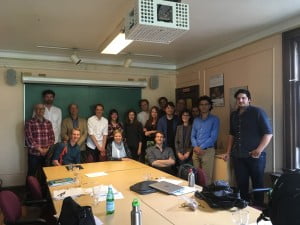
« From each according to their abilities, to each according to their needs »
2910 Boulevard Edouard-Montpetit
Montréal, QC H3T 1J7
Canada
Organisateurs: Pablo Gilabert (Concordia) et Peter Dietsch (UdeM).
Programme
Thursday, 7 June
9h30 Welcome
9h45-11h05 Lucas Stanczyk (Harvard University), « The Political Morality of Social Reproduction »
Commentator: Arash Abizadeh (McGill University)
11h05 – 11h15 Coffee
11h15 – 12h35 Julie Rose (Dartmouth College), “The Ideal of the Stationary State: Two Alternatives”
Commentator: François Claveau (Université de Sherbrooke)
12h35 – 14h15 Lunch
14h15 – 15h35 Carol Gould (City University of New York), “Socializing the Means of Free Development”
Commentator: Christine Straehle (University of Ottawa)
15h35 – 15h50 Coffee
15h50 – 17h10 Peter Dietsch (Université de Montréal), “On the Very Idea of an Efficient Wage”
Commentator: Katharina Nieswandt (Concordia University)
19h00 Workshop dinner
Friday, 8 June
9h30 – 10h50 AJ Julius (University of California at Los Angeles), “From each because to each”
Commentator: Colin Macleod (University of Victoria)
10h50 – 11h00 Coffee
11h00 – 12h20 Pablo Gilabert (Concordia University), “Exloitation, Solidarity, and Dignity”
Commentator: Vida Panitch (Carleton University)
12h20 Workshop ends
Abstracts
Peter Dietsch, “On the Very Idea of an Efficient Wage”
This paper argues that the standard characterisation of the equity-efficiency trade-off overstates the tension between these two values. The reason lies in the fact that economists tend to take individual labour supply preferences as given, which leads to a superficial analysis of the concepts of reservation wage and economic rent.
The paper distinguishes two kinds of reservation wages, one that refers to skills- and market-structure-induced scarcity, and one that refers to social norms governing remuneration. The former is relevant from an efficiency standpoint, whereas the latter operates on real world labour markets. The difference between them gives rise to an economic rent received by high-earning individuals that is obscured from view by the assumptions of standard economic analysis. Reducing this economic rent is a demand not only of justice, but also of efficiency.
The last section of the paper strengthens this conclusion further by drawing a parallel between expensive tastes in consumption and a certain class of high reservation wages. To the extent that the latter are underpinned by social norms rather than efficiency considerations, not paying them is both just and efficient.
Pablo Gilabert, “Exloitation, Solidarity, and Dignity”
This paper offers a new understanding of what exploitation is and of what is wrong with it. The focus will be on the critical assessment of the exploitation of workers in capitalist societies. Such exploitation is wrongful when it involves a contra-solidaristic use (and perhaps even allocation) of power to benefit oneself at the expense of others. Wrongful exploitation consists in using your greater power, and sometimes even in making other less powerful than you, in order to get them to benefit you more than they ought to. This account of exploitation is superior to others because it simultaneously captures three morally significant dimensions of exploitation-its material and social background, the relational (interpersonal and systemic) attitudes it enacts, and the final distributive outcomes it generates. Exploitation is indeed a multidimensional social process. The flipside of the proposed critical characterization of this process is a positive, solidaristic ideal of solidaristic empowerment in the allocation and use of economic power, which the paper articulates in terms of the socialist Abilities/Needs Principle (« from each according to ability, to each according to needs »). The Abilities/Needs Principle is grounded in human dignity.
Carol Gould, “Socializing the Means of Free Development”
Marx’s Abilities/Needs Principle, advanced for a high stage of the development of socialism, raises interesting philosophical and practical puzzles, e.g., regarding the meaning and limitation of needs, the problem of ‘material incentives’ for eliciting people’s contributions, the practicability and desirability of the abundance it presupposes, the sort of institutions and regulation it might require, whether central, local, or transnational, etc. I will argue that to properly interpret the principle and to determine the guidance it provides for social transformation, this principle needs to be taken in conjunction with another of Marx’s principles, namely, “The free development of each is a condition for the free development of all.” (Marx & Engels, The Communist Manifesto). I will argue that this reading provides some theoretical and practical guidelines for democratic socialism, centered on a principle of equal access to the conditions of free self-developing activity (both individual and collective). In previous work, I have elaborated this as a principle of equal positive freedom. Needs on this view can be usefully (and practically) shown to involve the fulfillment of economic and social human rights, as well as traditional civil and political ones, although this need not be taken reductively in a merely ‘sufficientarian’ way, but to point to an egalitarian principle, including also needs for recognition and for relationships. Central to the realization of the abilities/needs principle on this ‘equal positive freedom’ interpretation will be a system of worker self-managed firms that eschews a market in labor but still makes use of a market in goods and services. The focus on conditions for free development also helps us to understand how to deal with increasing automation and the replacement of traditional forms of work, and it can incorporate some new forms of socializing care work. But the problem of abundance and its impact on nature remains. I will conclude with some suggestions as to how the conjunction of the two principles even suggests a way of reinterpreting the meaning of abundance so that it can respect the integrity of the modes of functioning of nature and the environment.
AJ Julius, “From each because to each”
I develop a possible basis for the « From each… » standard. Cooperative production organized by this standard affords each producer the possibility of doing production as her own action. I contrast this possibility with the self-estrangement of commodity-producing labor. And I contrast this basis for the standard with an understanding on which it formulates a demand of distributive justice.
Julie Rose, “The Ideal of the Stationary State: Two Alternatives”
Skepticism about the value of economic growth is increasingly prominent today, with a growing political and social movement opposed to the “growth paradigm.” Some of these critics argue that a just society ought at some point to cease to pursue economic growth, and instead maintain a “steady-state” or “stationary state” economy. This paper analyzes the argument for the stationary state, examining two related normative and conceptual questions: On what grounds should a society cease to aim for economic growth? And what would it mean for a society to do so? I argue that there are two importantly distinct answers to these questions, a distinction that has been unappreciated yet is fundamental to assessing the justifiability of perpetually pursuing economic and social progress.
The first position holds that, beyond some point, a society should cease to aim for further economic growth because it is in conflict with the realization of further societal progress. This first position yields a progressive stationary state, in which a society ceases to aim for economic growth, while continuing to pursue progress on other dimensions. The second argument holds, instead, that, beyond some point, a society should cease to aim for further economic growth because its continued pursuit would be in conflict with the achievement of the good life or the just society, understood as an end which is complete in itself. This second view justifies a complete stationary state, in which a society ceases to aim not only for further economic growth but for perpetual progress on any dimension. Distinguishing these two ideals of the stationary state illuminates a central divide within current debates about economic growth, and contributes to our assessment of the question of how a society ought to weigh the value of the benefits brought by economic development against the burdens imposed by its pursuit.
Lucas Stanczyk, « The Political Morality of Social Reproduction »
Robert Nozick once described the attitude of left-leaning political philosophy toward the talents and abilities of productive people through the metaphor of “a horse in harness to a wagon, which horse doesn’t have to move ever, but if it does, it must draw the wagon along.” Nozick understood this description to be the basis of an indictment of left-leaning political philosophy, since in his view persons could not legitimately be made to work for the benefit of other persons, whatever one might legitimately do with horses. I do not share Nozick’s view, and thus I take the significance of his telling metaphor to lie elsewhere. Political philosophers of all stripes have overlooked important questions concerning the political morality of social reproduction.
In every society that persists over time and does not simply collapse or disband, there are processes in place whereby its continued existence is reproduced from one day to the next. These processes together are responsible for whatever benefits that life in the society brings, as well as for the social disadvantages that the persons living in the society are liable to experience. Among the most important ways that social reproduction in this sense can fall short of what morality demands is by exhibiting or depending on injustices of various kinds. This possibility gives rise to one of the more complex questions that can be asked about the content of political morality. How are we to conceive of justice in the ongoing production, or reproduction, of a whole society?
According to the view presented in this chapter, the answer to this question depends on considerably more than the demands of justice conceived as what is owed to each and every person. Equally important, how we are to conceive of justice in the labor-dependent process of a society’s continual reproduction depends on what can be reasonably expected from each person by way of individual productive contribution. The theory presented in this essay starts out from a recognition of the distinctness of these two perspectives.
While justice is often said to be essentially about what persons are owed, in the case of social justice this familiar description is misleading if not false. The maintenance of a society’s justice over time is not to be identified with the continuous proportional satisfaction of morally weighty claims. For besides rights, opportunities and other continuously recreated social goods, there are standing burdens of social life to be apportioned and individual duties to bear them as well. The proper burdens and duties of social life, moreover, do not lie in some pile like antibiotics or wealth, ready to be distributed according to a principle with this or that functional form. Our proper burdens and duties must instead be theorized in some satisfactory way, and for this purpose they cannot simply be deduced from a list of the important claims that people have. Wide reflective equilibrium among conceptions of basic rights and duties is called for, not simple deduction of one from the other. The task of this chapter is to sketch the main tools and concepts that I believe are necessary for this purpose.




